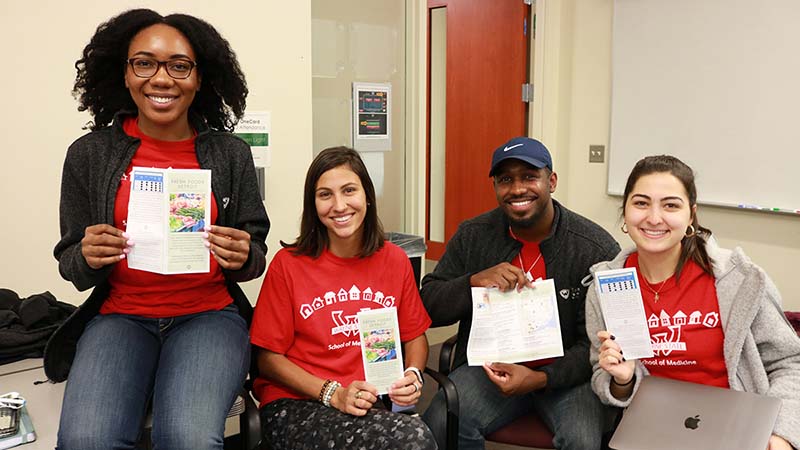
Thinking like an MD: Population, Patient, Physician and Professionalism course drives mission home
The Wayne State University School of Medicine’s new curriculum continues to build upon the school’s promise for urban clinical excellence by bringing its matriculates inside the heart of its mission. The Population, Patient, Physician and Professionalism course, or P4, is a Year 1 to Year 2 segment that emphasizes the evolving professional identity of a physician connected to patients and populations. The course exposes students to their roles as clinician, leader, interprofessional collaborator, scholar and systems analyst through large-group sessions, small-group sessions, online modules, self-directed reflective assignments and clinical opportunities in the community. The P4 Course for the Class of 2022 began in the summer of 2018 with a poverty simulation exercise, followed by units on aging and falls prevention, food insecurities, caring for veterans, working with individuals with disabilities and their families, and more, all from a hands-on, clinical-based perspective.
Hearing the homeless
Most recently, medical students met with several formerly homeless community members in September for a one-day series of panel discussions on “The Care of the Homeless Patient.”
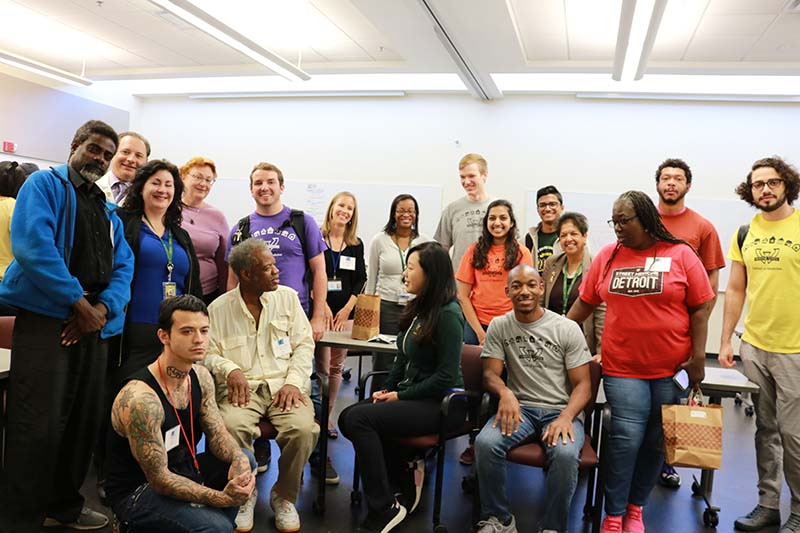
“The P4 Care of the Homeless Patient represents a critical part of the unique education we receive as medical students at Wayne State University. We had an opportunity to learn from the first-hand experiences of homeless patients and physicians who work with the homeless population of Detroit and under-insured patients,” said Class of 2022 student Arif Musa. “I am greatly appreciative of the courage and willingness of the panelists to share their stories and answer our questions. Obtaining the views of providers and homeless patients allowed for students to gain a broad perspective.”
The faculty physicians who participated shared the difficulties students may face within medicine to provide adequate care for those with unstable living conditions.
“It is important to solidify that any free clinic work or volunteering that we may do in the wider community is part of a wider network of care," said Rafael Ramos, another student in the Class of 2022.
"It was empowering to hear that some of the work we can do as students has a tangible effect in the lives of the people we work with and it's an enormous incentive to take our involvement in these activities seriously,” Ramos said.
Invaluable experience with veterans
In June, 33 Michigan veterans from the U.S. Air Force, Army and Marines visited the school to help medical students and allied health students better understand the health needs of veterans. The veterans served in the Vietnam and Gulf Wars.
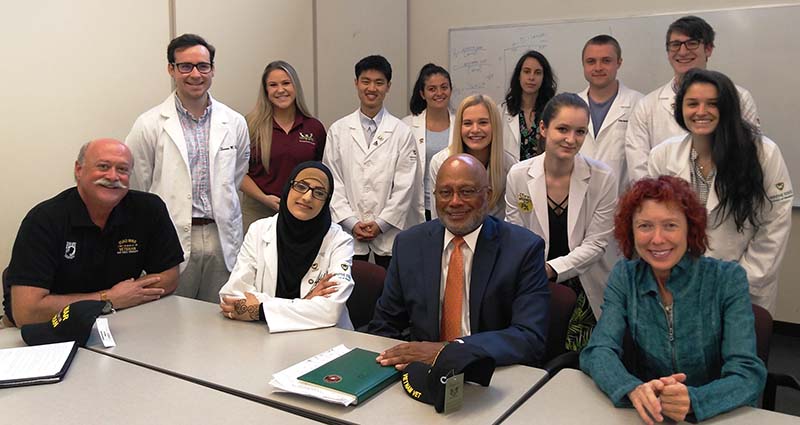
“As a student, this experience has been invaluable in that I didn't have to use the internet to imagine what my future allied health colleagues would do; I could ask them directly and get a better understanding from their own, unique perspectives,” said Class of 2022 medical student Joshua George-Lopez. “It assured me that I don't have to be alone in my decision-making when it comes to making a plan for my future patients, which was oddly a relief to a stressor I hadn't yet thought about.”
The veterans health session took an interdisciplinary approach to learning about a core group of health care constituents.
“This was our first time participating in the Veterans Health curriculum, and we are so incredibly thankful our students were awarded the possibility. We had 48 of our first-year students participate in the three-week course and the response was overwhelmingly positive. We felt this was an excellent opportunity to learn about the community we serve and grow our cultural competency while simultaneously learning about each others’ professions,” said Corinne Gratson, M.S., P.A.-C., an instructor in the College of Pharmacy and Health Sciences Physician Assistant Studies Program.
They learned best practices in the clinical assessment, treatment and care of veterans with musculoskeletal injuries and neuropathies related to vibration injuries; conducted biopsychosocial assessments; and learned to work collaboratively with physical and mental health professionals in developing treatment and care plans for veterans, military service members and their families. The veterans also helped the students understand stigma, ways to foster resilience and shared resources to help veterans access health and behavioral health services and reintegrate more successfully into communities.
A hungry population
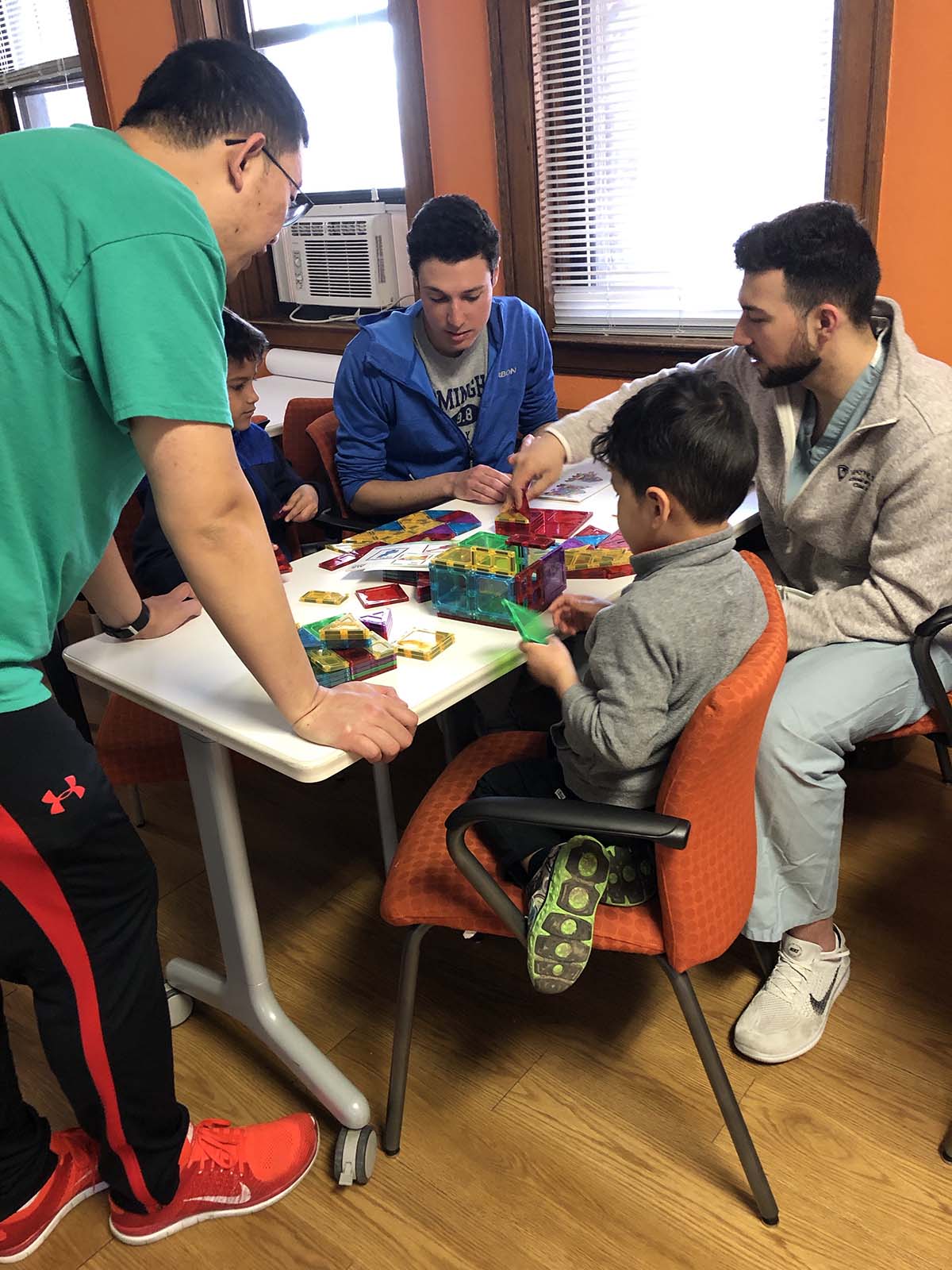
In April, P4 Course Director Nakia Allen, M.D., led a unit on food insecurity education, which led to a food and personal hygiene drive held in May, born out of the classroom assignment. The students presented food insecurity project presentations that could serve as a tool for educating physicians and/or patients on the topics learned in the unit, including nutrition counseling, figuring out how to pay for nutritious meals while on government food assistance, and more.
In addition to activities on campus, each Learning Community from the Class of 2022 volunteered with nonprofits such as Gleaners Food Bank, Keep Growing Detroit and Brilliant Detroit as part of the P4 course’s Service-Learning component. The outreach parallels Dr. Allen’s coursework, and is led by the school’s Director of Community Engagement Jennifer Mendez, Ph.D.
“I’m transitioning the students to understand, ‘Here’s a problem. What are we doing to help?’” Allen said. “They’re doing it in a way that’s patient-centered and sensitive. A lot of them are starting to understand that there is a lot to being a physician.”
Interviewing older adults
In January 2019, the class spent the night at an extended care facility, interviewing residents and staff caregivers to study how to prevent falls. The program provided physicians in training an opportunity to learn about the challenges of aging and experience the special qualities exhibited by older persons.
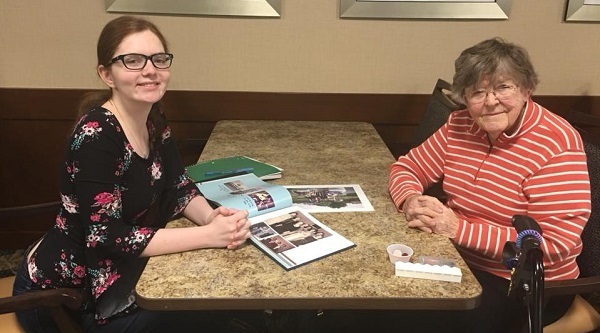
Students provided the older adults with education on strength and balance exercises, properly managing medications, the need for regular vision checks and how to make their living environments safer. They also interviewed residents during dinner, asking them about fond memories, hobbies, their definition of happiness, who they talk to when feeling sad or lonely, and more.
“There is a lack of emphasis placed on teaching medical students about the unique challenges experienced in the aging process. The students in their first few weeks experience compassion and understand the value of engaging with staff from all levels of care, and it is a tremendous opportunity,” said LaTonya Riddle-Jones, M.D., co-director of the Service Learning program.
Kafa Alshohatee visited The Park at Trowbridge in Southfield, Mich. She was so positively affected by the 90-year-old resident she met and interviewed, she returned on her own time to throw him a birthday party.
“When I had my first meeting, I never knew how much that me being there would contribute to the older adult’s life. I underestimated going there. I just decided to visit again,” she said. “That’s all they needed was for someone to be there and to listen. It was an interesting experience and an eye-opener for me.”
How does it feel to be poor?
“There was pretty much struggle the entire month.”
“I definitely felt a sense of hopelessness.”
“It is really easy to see how health and education become secondary to basic necessities.”
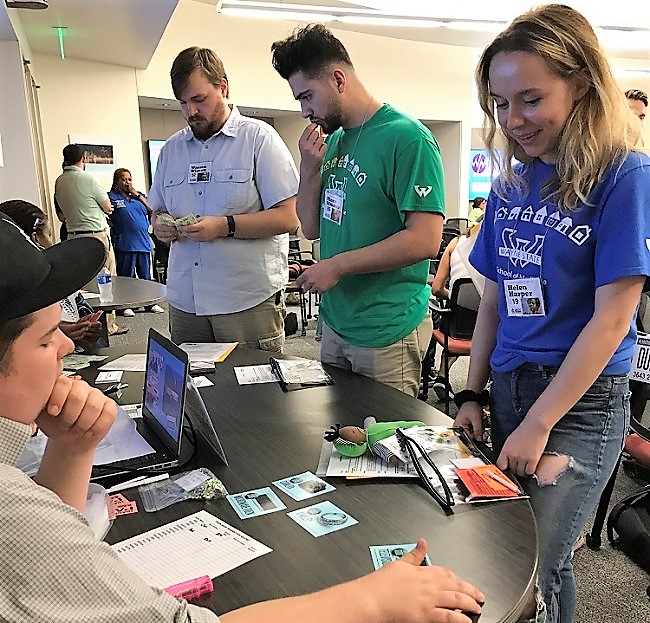
These were the words members of Class of 2022 used to explain how they felt to be poor. And while their poverty was simulated, and lasted less than three hours in real time, the experiences they had, shared and witnessed were all rooted in reality.
In August 2018, the school hosted three Poverty Simulation training sessions to help students better understand what life is like with a shortage of money and an abundance of stress. The goal of the training was to prepare students for the potential challenges facing their future patients, while increasing their empathy and effectiveness as they care for patients facing these daily challenges.
Using a simulation kit, students assumed the roles of families, couples or individuals facing poverty and were required to provide food and shelter. They also had to make decisions on how to spend what little money they were given to survive. Standardized Patients for the School of Medicine played employees representing community resources and services such as a bank, utility company, pawn broker, day care center and more. The students experienced a simulated month -- represented by four 15-minute “weeks” -- and tried to provide for their families while dealing with crime, utility shut-offs, unemployment and a host of other issues.